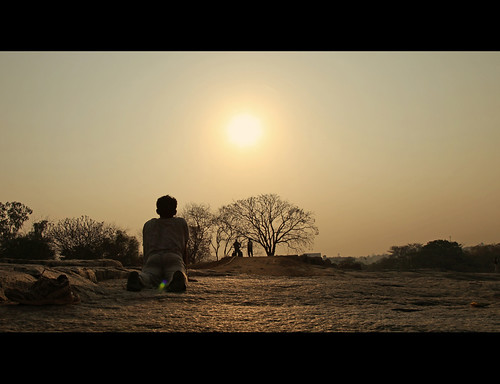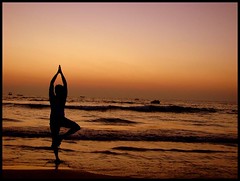“Practice is . . . a process by which we can experience the world and our engagement with it as meaningful.” -Wenger, 1998.
For those who haven’t been following along, my thesis work has been looking at Communities of Practice theory and applying it to make design recommendations to an online professional development community for MYP teachers. When I first came across the above quote, my mind immediately went to yoga. I’ve written before about the connections between yoga and education, and I’m certain I’ll write about them again in the future.
“Before you’ve practiced, the theory is useless. After you’ve practiced, the theory is obvious.” –David Williams, original attribution unknown
The disconnect between theory and practice is a hot topic in education — always has been, always will be. I’m hard-pressed to think of another profession where it is not mandated for theory and research to be incorporated into the actual practice (Medicine? no. Law? definitely not. Finance? unlikely.) In education, I think one of the reasons for this disconnect is because it’s so easy for us to go into a classroom, close the door, and completely forget about our teaching practice. I realize this sounds strange, but it happens all the time. I’d be lying to you if I told you that every single minute that I’ve been a teacher, I have been thinking consciously about what I’m doing that makes up my teaching practice. And I bet that for many of us, an entire day (or days) could go by when we don’t actively reflect and think about what it means to be a teacher. What are those things that make up our practice and make it effective? What is it that we do every day? Are the pedagogies we laud embedded into every routine, policy, lesson, and mere utterance in our classrooms? Of course, it’s probably unrealistic to expect such a thing, but my point is this: how often are we thinking about what our teaching practice is?
Definition of PRACTICE
1 a : actual performance or application <ready to carry out in practice what they advocated in principle> b : a repeated or customary action <had this irritating practice> c : the usual way of doing something <local practices> d : the form, manner, and order of conducting legal suits and prosecutions
2 a : systematic exercise for proficiency <practice makes perfect> b : the condition of being proficient through systematic exercise <get in practice>
3 a : the continuous exercise of a profession b : a professional business; especially : one constituting an incorporeal property
- What defines your teaching practice? If you had to sum it up in a sentence, how would you describe it? What is its essence?
- Where do these essential concepts of your practice come from? Did you create them? Were they adopted from another teacher — perhaps someone who taught you? Are they a tradition of our profession? Are they part of your personality? Or were they handed to you by someone in your school, as a requirement?
- How does your daily teaching practice embody pedagogy? Which pedagogies are represented? Did you choose these pedagogies, or did someone else? Or did they simply evolve?
- What drives you to continue your practice? What inspires you in your practice? Why?
- Who do you turn to for guidance, mentoring, and encouragement in your practice? Who provides you with mental and moral support? What is it about this person/these people that draws you to seek them out for assistance or leadership?
- What aspects of your teaching practice do you feel perhaps don’t belong there? Are there aspects that perhaps need to be refurbished, repurposed, or simply tossed? Why? Do they have value?
- Which learning theories are you aware of? How is it that you became aware of them? When did they first cross your path? Are there new learning theories that you don’t yet feel you know well, but would like to? Or ones you’re aware of that you’d like to learn more about?
- Do you see any connections between your practice — as defined, described, and stated by yourself — and learning theories? Any gaps you’d like to fill? Any surprising connections that deserve more focus, dwelling on, sharing, or elaboration?
I suspect that if educators went deep into this kind of self-reflection, and shared it with others, that they might develop a new appreciation for the complexity and richness that is their teaching practice. Indeed, it should be examined, talked about, and celebrated. Your teaching practice exists because you care about your students and want them to learn. By investing in your practice, you invest in your students, your institutions, and yourself. Letting your practice lead your professional learning is a reciprocal and generative act. Your practice is beautiful.
“So, are you a guru?” I asked Mr. Iyengar. I had been going to Iyengar Yoga classes for three years, and B.K.S. Iyengar was visiting Australia for the first time. I was making a one-hour radio program on yoga and interviewed the great master. He replied, “Your guru is your practice.” The greatest thing a guru could ever say. You learn to do it by doing it. -Baranay, 2007
References:
Baranay, I. (2007). “Your guru is your practice.” In Busia, K. (Ed.), Iyengar: The yoga master (pp. 15-24). Boston, MA: Shambhala Press.
Wenger, E. (1998). Communities of practice: Learning, meaning, and identity. Cambridge, UK: Cambridge University Press.
Ballerina by Mait Jüriado
seventh sense by woodleywonderworks
Practice Yoga! Be Healthy! by VinothChandar


 Many of you who follow me on
Many of you who follow me on 
